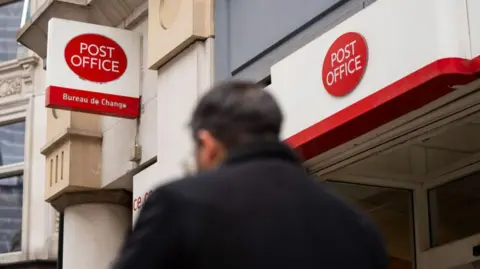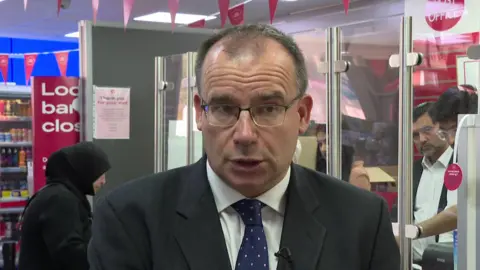Post Office could be owned by its postmasters, government says
 Getty Images
Getty ImagesOwnership of the Post Office could be put into the hands of its postmasters, the government has suggested, as it launched a public consultation over the future of the service.
The minister responsible, Gareth Thomas, said it was time for "a fresh vision" for the service, but said the government did not plan to reduce the number of branches.
The Post Office operates counters or shops in more than 11,500 locations around the country and is fully state-owned and subsidised by the taxpayer.
Plans for mutualisation have been under discussion for more than a decade, but were sidelined as the scandal around the wrongful conviction of sub-postmasters unfolded.
The government said it also wanted to transform the organisation's culture in the wake of the scandal which saw hundreds of sub-postmasters wrongly accused of false accounting and theft at the branches they were running on the basis of data from faulty accountancy software called Horizon.
The scandal was brought back into the spotlight last week after the public inquiry into what went wrong published its first report, focusing on the impact on sub-postmasters and their families.
"We all know, sadly, the grim legacy... so this is about fixing the fundamental problems," Thomas told the BBC.
The Post Office had to be transformed so that it was trusted by its postmasters as well as by the general public again, he said.
But he said he also wanted the 12-week consultation to start a national debate over how the organisation should be run in the future, including the options of mutual ownership or a charter model like the BBC.

The consultation includes a question over whether the Post Office should still be required to operate 11,500 branches. However, Thomas said the government believed the current size of the network was "broadly right" and did not foresee closures.
The minister also announced a further £118m to support the work already under way to deliver changes in the Post Office.
Future services
As well as the question of ownership, the government is asking for views on what services the Post Office should offer in future, with a particular focus on banking, as major lenders continue to close High Street branches.
Currently customers can use the Post Office to pay in and withdraw money from accounts at most banks.
They can buy foreign currency, pick up welfare benefit forms and payments, and submit passport applications. But the full range of services are only offered at larger sites.
Research published alongside the so-called Green Paper on the future of Post Office suggests it adds "social value" of £5.2bn per year to households and £1.3bn annually to small and medium-sized businesses.
But the business has struggled to make a profit, relying on tens of millions of pounds of state subsidy, as customers posted fewer letters and turned to online services and other delivery operators, bypassing Post Office counters.
According to the Post Office, currently 99.7% of the population live within three miles of a Post Office and 4,000 of its branches are open seven days a week.
The Post Office has already announced it is shifting its last remaining standalone shops to the model that the majority are already run on, which grants franchise-holders the right to offer Post Office services alongside other retail services.
The government said it did not plan to pursue "potentially expensive" shifts in ownership structure until the Post Office had achieved "financial and operational stability".
However, it floated two alternatives for longer-term change:
- A joint venture between the government and a mutually owned postmaster-led body, which may or may not include other stakeholders from among its other employees, customers and the community
- A charter model – as used for the BBC and universities – with the government setting out guiding principles but relinquishing its ownership role
The idea of shared-ownership was first raised in 2012 after the Post Office was split from the Royal Mail, the service that delivers post to the door.
Many smaller businesses already use mutual models, but the most well-known larger UK businesses run that way are the John Lewis Partnership and the Co-operative.
In mutually-run organisations, staff are more closely involved with decision-making and have a greater stake in the performance of the business.
Last year, Thomas told parliament nearly half of branches were not profitable or made only a small profit from Post Office business. That has led to a stagnation in pay for postmasters.
Rose Marley, chief executive of Co-operatives UK, a body that promotes the mutual ownership of businesses said that employee-owned businesses were proven to be more productive and in this case the switch could be "genuinely transformative".
She said the Horizon scandal would have been much less likely under shared ownership.
"A stakeholder-led Post Office would be far better placed to surface concerns early and protect those on the front line," she said.
"It would hardwire in a culture of transparency and shared responsibility."
